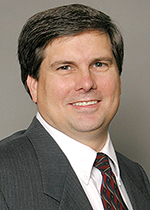Kevin Ezell, president of the North American Mission Board, and Thom Rainer, president of LifeWay Christian Resources, appointed a discipleship task force two years ago. Consisting of pastors, the task force was charged with recommending steps leaders can take to spark a disciple-making culture in churches. Two Kentuckians were among those appointed: Kevin Smith of Highview Baptist Church in Louisville, and Pavel Urruchi of Erlanger Baptist Church.
“This group will suggest a transferrable process that any church can use in any context,” Ezell tasked the group. “The priority will be leading people to the Gospel and then putting them on a pathway to spiritual growth and maturity.”

Dr. Todd Deaton
Editor
Chairman Robby Gallaty, of Hendersonville, Tenn., rightly assessed when the discipleship group formed, “Biblical disciple-making includes both inviting—evangelism—and investing—discipleship. We cannot have one without the other.” He added, “For years, we have been ‘decisionistic,’ but we need to be more ‘disciplistic.'”
Church leaders should shift their mentality away from seeing decisions and baptisms as their goal, Gallaty maintained. Rather, they must see baptism as the start of a lifelong spiritual journey, in which disciples learn to make disciples. In analyzing data from the last 20 years, his task force discovered that despite seeing 7.1 million baptisms, average church attendance in the SBC remained virtually flat, since about an equal number of people had dropped out of attending church.
During a forum in the SBC exhibit hall this year, Ezell observed, “We don’t have a baptism issue as much as we have an obedience issue. We just don’t have people intentionally having Gospel conversations as often as they should or intentionally discipling people as they should.” In the same forum, Eric Geiger, of LifeWay Christian Resources, put his finger on a key missing aspect: “Reading the Bible is the one spiritual discipline that impacts every other spiritual discipline.” Accordingly, the task force encourged personal Bible engagement and promoting small groups that multiply.
Contrarily, a recent Gallop poll indicates our culture’s moral compass is slipping. Americans are adopting more permissive views toward homosexuality, premarital sex, divorce, marijuana, pornography, abortion and alcohol. The influence of Christians has never been more needed, Barrett Duke, a former executive of the Ethics and Liberty Commission, assessed. “As our citizens are jettisoning biblical morality, we are seeing the effects in every area of life, but especially on our families,” said Duke, who is now executive director of Montana Baptists. “The country has never been so rudderless. The challenges here have never been greater. The church has never been needed more.”
Improving discipleship is imperative, and it begins with reading the Bible. “Without revival in our churches that spreads out into our communities, we can expect to see more acceptance of destructive values and lifestyles among our own members and in our communities,” Duke continued. “The church must equip itself to minister in this brokenness and love their neighbors with a sacrificial love.” In order for Christians to influence the world with the Gospel, a renewed commitment to biblical teaching and godly living is necessary.
One of the most meaningful messages at this year’s convention, at least from my perspective, turned out to be one that almost wasn’t. Texan Kie Bowman stepped in for Paige Patterson, calling on God to breathe life into our struggling families, churches and ministries. Using God’s strange instructions to His prophet in Ezekiel 37, Bowman fittingly declared, “God’s solution to the biggest problem imaginable, a valley of dry bones, was pretty simple: Declare the word of the Lord to a culture that will not hear or cannot hear, and just keep declaring the mighty works of our sovereign God who says, ‘I will give you life.'”
Bowman added, “… It may feel like to you that there are a lot of dry bones around your life, but here’s your good news: God specializes in raising the dead, and nothing is impossible with God.” But believers don’t grow spiritually by accident, he noted. If we want an Ezekiel 37 moment in our families, churches and ministries, we must be more intentional in inviting God to “breathe life into all of our dead places.”
Growing as a disciple is a matter of allowing God’s Word to renew our spirits daily and that, in turn, sparks the desire to share Christ with others. Thus, kingdom growth isn’t really about increasing baptisms, it’s about becoming a disciple who is obedient to God’s call to make other disciples.
Todd Deaton